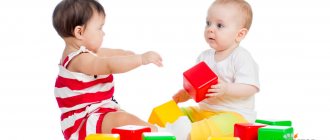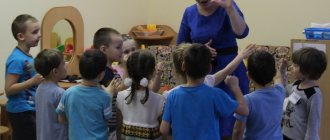Tasks and goals of social and communicative development of preschool children
The process of socialization of a preschooler is multifaceted, since it is influenced by a wide variety of factors:
- heredity;
- the environment surrounding the child;
- the atmosphere in which education takes place;
- games;
- own activities;
- self-development and self-knowledge.
The main goal of the social and communicative development of preschool children is their timely and painless socialization through familiarization with the norms of communication accepted in a given society, with general cultural traditions accepted both in the family and in the country as a whole, in building relationships between peers and older generations. According to the Federal State Educational Standards, each educational institution must have a special program, the implementation of which allows one to achieve all the set goals for the development of children. The ultimate goal, in this case the socialization of the child, can be successfully achieved if the tasks are set correctly, the most important of which are the following:
- comprehension of the main values and moral norms accepted in society;
- developing the child’s ability to make decisions and independence;
- helping the child learn the basic rules of communication with peers and older generations;
- teach the child to show such emotional components of communication as mercy, responsiveness, empathy;
- instilling in children respect for their own family, peers, elders and society as a whole;
- help children develop positive attitudes regarding creativity and work;
- instilling in children a willingness to work and relax together;
- instilling in preschoolers the basics of behavior that is safe for their own lives, as well as the lives of people around them, anywhere (at home, in nature, in society).
If these tasks can be solved, then we can hope to achieve the main goal of the social and communicative development of children of all preschool ages. Then the transition to a qualitatively new school environment will become possible, since the child will be sufficiently prepared and will not encounter any particular difficulties or insoluble problems.
Play is the best method of social and communicative development of children
At one time, the innovator and teacher V.A. Sukhomlinsky noted that through play and fairy tales, the unique creativity of a child lies the shortest path to his heart. For parents and educators, it is the game that can become a faithful assistant in the process of children's social and communicative development. Not only for children, but also for much older children, play continues to be the main activity, and communication during play becomes an integral component of it. Psychologist L.S. Rubinstein also assigned a significant role to play activity and noted its importance in the life of a child. He said that only in the process of play does a child not only imitate someone’s personality and play someone else’s role, but at the same time enrich, deepen, and expand his own. As a result, he understands the world around him more easily and understands the events taking place in it. But games are different: usually those that are interesting to the smallest children no longer attract 4-5 year olds. Play activities must be appropriate for children’s age, and the child must feel that he can control events in the game. Only then will he not only understand the importance and meaning of relationships between people, but also determine his place in them, which will help the formation of experience and communication skills necessary not only at this stage of development, but also in the future.
Games for the little ones
For children 2-3 years of age, ordinary role-playing games on classic themes (“daughters and mothers,” “playing a doctor,” “playing a store”) are useful. But it is very important that one of the adults (parents, grandmothers, teacher) takes part in the game, because it is the adults who, by their example, must show the child how to properly conduct a conversation, greet each other, achieve what he wants or refuse something.
"Emotion"
For middle-aged children, the game “Emotion” should seem interesting. In it, the child gains valuable experience in expressing emotions, and also learns to correctly recognize them in other children and respond accordingly. The child can be asked to depict his own emotions, after which other participants in the game, who can be not only children, but also adults, must guess what feeling he depicted.
"Situation"
The game “Situation” will be interesting for older preschoolers. An adult participant invites the child to simulate some situation. For example, a child came to the garden with a dozen apricots, the question is what will he do with them: will he share with friends, eat it himself, or give it to the teacher? It is important that the child explains and motivates his own actions out loud. Another option - let's say a child wins a competition, but his friend loses and is very upset. What should the winner do? With the help of such games, children not only gain excellent communication experience, developing their social and communication skills, but also acquire communicative competence for the future. In addition, they are preparing for painless socialization, when the child will have to independently, without the help of adults, react to events, make decisions and participate in these events.
What is socio-communicative development?
The social and communicative development of a child means the complex process of learning to establish and maintain contacts with other people. It is he who lays down the communicative abilities of the future personality, which is understood as the entire set of knowledge, abilities and skills with the help of which a person can adequately perceive and react in the process of communication to the surrounding reality. Simply put, a child needs social and communicative development so that later, when entering school, university and work, he does not experience problems communicating with members of different groups and turns into a full-fledged social unit. There is no doubt about the complexity and length of the process of acquiring communicative competence, so it should begin from early childhood.





